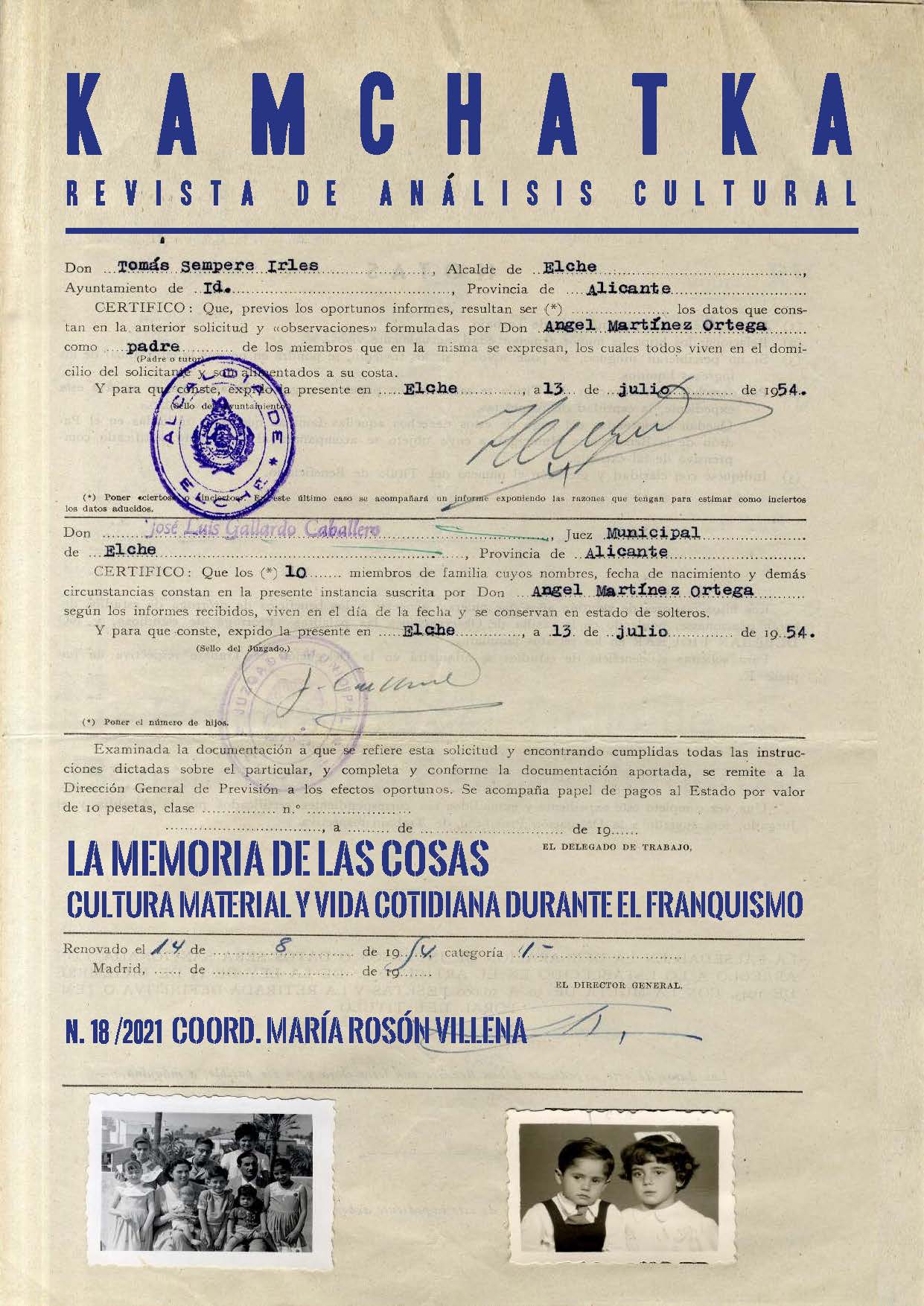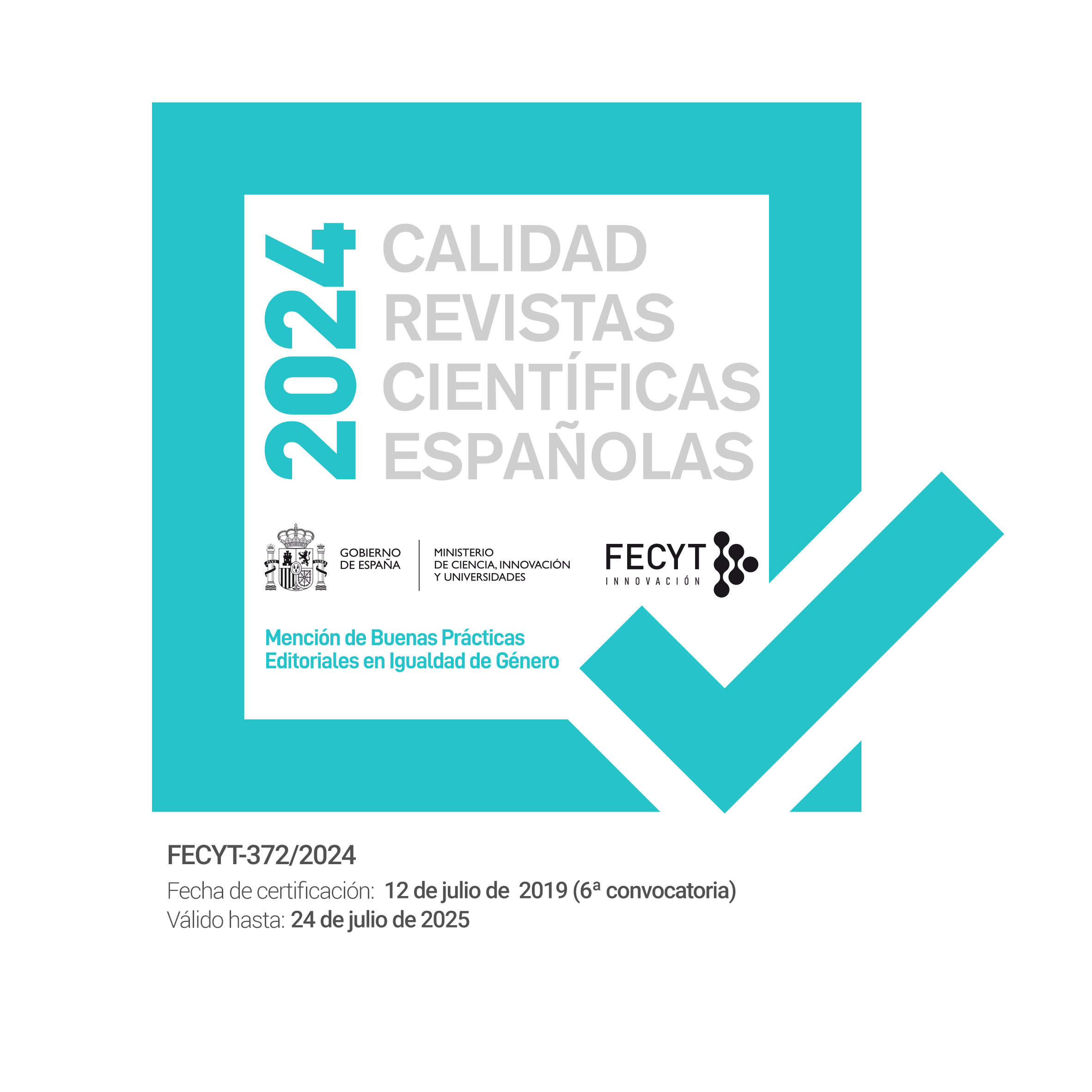Pensar lo material
DOI:
https://doi.org/10.7203/KAM.18.20796Palabras clave:
materialidad, cultural material, afecto, memoria Resumen
Resumen
Esta versión revisada y actualizada de un artículo publicado originalmente en inglés en 2010 constituye una introducción a las principales teorizaciones en lengua inglesa del afecto (entendido este término en el sentido que ha adquirido en los affect studies) y de la materialidad. Termina con unas reflexiones sobre cómo estas teorizaciones podrían ser aprovechadas por los investigadores en las humanidades.
 Descargas
Descargas
 Citas
Citas
Ahmed, Sara (2004). The Cultural Politics of Emotion. Nueva York: Routledge.
Ahmed Sara (2017). La política cultural de las emociones. Ciudad de México: Universidad Nacional de México.
Appadurai, Arjun (1988). The Social Life of Things: Commodities in Cultural Perspective. Cambridge: Cambridge University Press.
Appadurai, Arjun (1991). La vida social de las cosas. Perspectiva cultural de las mercancías. Ciudad de México: Grijalbo.
Barad, Karen (2007). Meeting the Universe Halfway: Quantum Physics and the Entanglement of Matter and Meaning. Durham (NC): Duke University Press.
Barthes, Roland (1973). Le plaisir du texte. Paris: Éditions du Seuil.
Barhes, Roland (2011). El placer del texto. Madrid: Siglo XXI.
Benjamin, Walter (2007). Illuminations. Introducción de Hannah Arendt. Nueva York: Schocken Books.
Benjamin Walter (2018). Iluminaciones. Madrid: Taurus.
Bennett, Jane (2010). Vibrant Matter. Durham (NC): Duke University Press.
Berlant, Lauren (2011). Cruel Optimism. Durham (NC): Duke University Press.
Blackman, Lisa (2012). Immaterial Bodies: Affect, Embodiment, Mediation. London: Sage.
Bolufer, Mónica (2016). “Reasonable Sentiments: Sensibility and Balance in Eighteenth-Century Spain”. Delgado, Luisa Elena, Fernández, Pura y Labanyi, Jo (eds.). Engaging the Emotions in Spanish Culture and History. Nashville (TN): Vanderbilt University Press: 21-38.
Brenan, Teresa (2004). The Transmission of Affect. Ithaca (NY): Cornell University Press.
Brinkema, Eugenie (2014). The Forms of the Affects. Durham (NC): Duke University Press.
Brown, Bill (2003). A Sense of Things: The Object Matter of American Literature. Chicago: University of Chicago Press.
Brown, Bill, ed. (2004). Things. Chicago: University of Chicago Press.
Butler, Judith (1995). Bodies that Matter: On the Discursive Limits of Sex. Nueva York: Routledge.
Butler, Judith (2014). Cuerpos que importan. Sobre los límites materiales y discursivos del sexo. Buenos Aires: Paidós.
Cernuda, Luis (1993). Obra completa, vol. 1: Poesía completa. Edición de Derek Harris y Luis Maristany. Madrid: Siruela.
Chen, Mel Y. (2012). Animacies: Biopolitics, Racial Mattering, and Queer Affect. Durham (NC): Duke University Press.
Clough, Patricia, (ed.) (2007). The Affective Turn: Theorizing the Social. Durham (NC): Duke University Press.
Critchley, Simon (2005). Things Merely Are: Philosophy in the Poetry of Wallace Stevens. Londres: Routledge.
DeLanda, Manuel (1997). A Thousand Years of Nonlinear History. Nueva York: Zone Books.
DeLanda, Manuel (2012). Mil años de historia no lineal. Barcelona: Gedisa.
Deleuze, Gilles (2003). Francis Bacon: The Logic of Sensation. Minneapolis: University of Minnesota Press.
Deleuze, Gilles (2013). Francis Bacon: Lógica de la sensación. Madrid: Arena Libros.
Delgado, Luisa Elena, Fernández, Pura y Labanyi, Jo, (eds.) (2016). Engaging the Emotions in Spanish Culture and History. Nashville (TN): Vanderbilt University Press.
Delgado, Luisa Elena, Fernández, Pura y Labanyi, Jo (eds) (2018). La cultura de las emociones y las emociones en la cultura española contemporánea (siglos XVIII-XXI). Madrid: Cátedra.
Fernández, Pura (2016). “Emotional Readings for New Interpretative Communities in the Nineteenth Century”. Delgado, Luisa Elena, Fernández, Pura y Labanyi, Jo (eds.). Engaging the Emotions in Spanish Culture and History. Nashville (TN): Vanderbilt University Press: 56-76.
Henare, Amiria, Holbraad, Martin y Pribram, E. Deirdre (eds.) (2007). Thinking through Things: Theorising Artefacts Ethnographically. Londres: Routledge.
Jardine, Lisa (1996). Worldly Goods: A New History of the Renaissance. Nueva York: Nan A. Talese / Doubleday.
Latour, Bruno (1993). We Have Never Been Modern. Cambridge (MA): Harvard University Press.
Latour, Bruno (2007). Nunca hemos sido modernos. Madrid: Editorial Debate.
Latour, Bruno (2005). Reassembling the Subject: An Introduction to Actor-Network Theory. Oxford: Oxford University Press.
Latour, Bruno (2008). Reensamblar lo social. Una introducción a la teoría del actor-red. Buenos Aires: Manantial.
Leys, Ruth. “The Turn to Affect: A Critique”. Critical Inquiry 37 (2011): 434-472.
Marks, Laura (1999). The Skin of the Film: Intercultural Cinema, Embodiment, and the Senses. Durham (NC): Duke University Press.
Marks, Laura (2002). Touch: Sensuous Theory and Multisensory Media. Minneapolis: University of Minnesota Press.
Massumi, Brian (2002). Parables for the Virtual: Movement, Affect, Sensation. Durham (NC): Duke University Press.
Miller, Daniel (ed.) (2005). Materiality. Durham (NC): Duke University Press.
Miller, Daniel (2008). The Comfort of Things. Cambridge: Polity.
Miller, Daniel (2010). Stuff. Cambridge: Polity.
Mitchell, W.J.T. (2004). What Do Pictures Want? The Lives and Loves of Images. Chicago: University of Chicago Press.
Mitchell, W.J.T. (2017). ¿Qué quieren las imágenes? Una crítica de la cultural visual. Vitoria-Gasteiz: Sans Soleil Ediciones.
Mulvey, Laura (1989). “Visual Pleasure and Narrative Cinema”. Visual and Other Pleasures. Londres: Macmillan: 14-26.
Mulvey, Laura (1988). Placer visual y cine narrativo. Valencia: Artes Gráficas Soler.
Ngai, Sianne (2005). Ugly Feelings. Cambridge (MA): Harvard University Press.
Nussbaum, Martha C. (1992). Love’s Knowledge: Essays on Philosophy and Literature. Nueva York: Oxford University Press.
Nussbaum, Martha C. (2016). El conocimiento del amor. Ensayos sobre filosofía y literatura. Madrid: Antonio Machado Libros.
Nussbaum, Martha C. (2001). Upheavals of Thought: The Intelligence of Emotions. Cambridge (UK): Cambridge University Press.
Nussbaum, Marta (2008). Paisajes del pensamiento. La inteligencia de las emociones. Barcelona: Paidós.
Pietz, William (1993). “Fetishism and Materialism: The Limits of Theory in Marx”. Apter, Emily y Pietz, William (eds.). Fetishism in Cultural Discourse. Ithaca (NY): Cornell University Press: 119-151.
Price, Rachel (2014). The Object of the Atlantic: Concrete Aesthetics in Cuba, Brazil and Spain, 1968-1968. Evanston (IL): Northwestern University Press.
Scheer, Monica. “Are Emotions a Kind of Practice (And Is That What Makes Them Have a History?). A Bourdieuian Aproach to Understanding Emotion”. History and Theory 51/2 (2012): 193-220.
Shaviro, Steven (1993). The Cinematic Body. Minneapolis: University of Minnesota Press.
Sobchack, Vivian (2004). Carnal Thoughts: Embodiment and Moving Image Culture. Berkeley: University of California Press.
Stallybrass, Peter (1998). “Marx’s Coat”. Spyers, Patricia (ed.). Border Fetishisms: Material Objects in Unstable Spaces. Nueva York: Routledge: 183-207.
Thrift, Nigel (2008). Non-Representational Theory: Space / Politics / Affect. Londres: Routledge.
Descargas
Publicado
Cómo citar
-
Resumen2306
-
Texto rescatado PDF1628
Número
Sección
Licencia
Los textos publicados en esta revista están –si no se indica lo contrario– bajo una licencia Reconocimiento-NoComercial 4.0 de Creative Commons. Puede copiarlos, distribuirlos y comunicarlos públicamente siempre que cite su autor y el nombre de esta publicación, Kamchatka. Revista de análisis cultural y no los utilice para fines comerciales. La licencia completa se puede consultar en Creative Commons.
Aquellos autores/as que tengan publicaciones con esta revista, aceptan los términos siguientes:
- Los autores/as conservarán sus derechos de autor y garantizarán a la revista el derecho de primera publicación de su obra, el cuál estará simultáneamente sujeto a la Licencia de reconocimiento no comercial de Creative Commons que permite a terceros compartir la obra siempre que se indique su autor y su primera publicación esta revista.
- Los autores/as podrán adoptar otros acuerdos de licencia no exclusiva de distribución de la versión de la obra publicada (p. ej.: depositarla en un archivo telemático institucional o publicarla en un volumen monográfico) siempre que se indique la publicación inicial en esta revista.
- Se permite y recomienda a los autores/as difundir su obra a través de Internet (p. ej.: en archivos telemáticos institucionales o en su página web) antes y durante el proceso de envío, lo cual puede producir intercambios interesantes y aumentar las citas de la obra publicada.





